- Home
- John Irving
The Cider House Rules Page 11
The Cider House Rules Read online
Page 11
He did notice that Melony was already in her usual position, in her expected, brief attire. He met her eyes, which were piercing but withholding opinion; then he looked down, or away, or at his hands holding Jane Eyre.
"Hey, you," he heard Melony say to him--and he heard a subsequent hush fall among the other girls. "Hey, you," Melony repeated. When he looked up at her, she was kneeling on her bed and shoving toward him the biggest bare ass he'd ever seen. A blue shadow (perhaps a bruise) discolored one of Melony's straining thighs; between the bulging, flexed cheeks of her intimidating buttocks, a single dark eye stared at Homer Wells. "Hey, Sunshine," Melony said to Homer, who blushed the color of the sun at sunrise or sunset. "Hey, Sunshine," Melony crooned sweetly to him--thus giving to the orphan Homer Wells her own name for him: Sunshine.
When Homer told Dr. Larch what Melony had done to him, Dr. Larch reconsidered the wisdom of allowing Homer to read to the girls' division. But to remove this chore from the boy's duties would constitute, Larch felt, a kind of demotion; Homer might suffer a sense of failure. The work at an orphanage is fairly decisive; when Wilbur Larch felt indecisive, regarding Homer Wells, he knew he was suffering from the natural feelings of a father. The thought that he had allowed himself to become a father and a sufferer of a father's indecision so depressed Dr. Larch that he sought the good peace of ether--to which he was becoming, steadily, more accustomed.
There were no curtains at St. Cloud's. The hospital dispensary was a corner room; it had a south window and an east window, and it was the east window, in Nurse Edna's opinion, that made Dr. Larch such an early riser. The slim, white-iron hospital bed never looked slept in; Dr. Larch was the last to bed and the first to rise--enhancing the rumor that he never slept at all. If he slept, it was generally agreed that he slept in the dispensary. He did his writing at night, at the typewriter in Nurse Angela's office. The nurses had long ago forgotten why this room was called Nurse Angela's office; it was St. Cloud's only office room, and Dr. Larch had always used it for his writing. Since the dispensary was where he slept, perhaps Dr. Larch felt the need to say that the office belonged to someone else.
The dispensary had two doors (one leading to a toilet and shower), which in such a small room created a problem with furniture. With a window on the south end and on the east wall, and a door on the north and on the west, there was no wall one could put anything against; the stark bed fit under the east window. The closed and locked cupboards with their frail glass doors formed an awkward maze around the dispensary counter in the middle of the room; it seemed fitting, for a dispensary, that the medicines and the ether cans and the hardware of small surgery should occupy the most central space, but Larch had other reasons for arranging the room this way. The labyrinth of cabinets in the middle of the room not only left access to the hall and bathroom doors; it also blocked the bed from view of the hall door, which, like all the doors in the orphanage, had no lock.
The cluttered dispensary afforded him some privacy for his ether frolics. How Larch liked the heft of that quarter-pound can. Ether is a matter of experience and technique. Imbibing ether is pungent but light, even though ether is twice as heavy as air; inducing ether anesthesia--bringing one's patients through the panic of that suffocating odor--is different. With his more delicate patients, Larch often preceded his ether administration with five or six drops of oil of orange. For himself, he required no aromatic preparation, no fruity disguise. He was always conscious of the bump the ether can made when he set it on the floor by the bed; he was not always conscious of the moment when his fingers lost their grip on the mask; the cone--by the force of his own exhalations--fell from his face. He was usually conscious of the limp hand that had released the cone; oddly, that hand was the first part of him to wake up, often reaching for the mask that was no longer there. He could usually hear voices outside the dispensary--if they were calling him. He was confident that he would always have time to recover.
"Doctor Larch?" Nurse Angela or Nurse Edna, or Homer Wells, would ask, which was all Larch needed to be brought back from his ether voy-age.
"Right here!" Larch would answer. "Just resting."
It was the dispensary, after all; don't the dispensaries of surgeons always smell of ether? And for a man who worked so hard and slept so little (if he slept at all), wasn't it natural that he would need an occasional nap?
It was Melony who first suggested to Homer Wells that Dr. Larch possessed certain remote habits and singular powers.
"Listen, Sunshine," Melony told Homer, "how come your favorite doctor doesn't look at women? He doesn't--believe me. He won't even look at me, and every male everywhere, every time, looks at me--men and boys look at me. Even you, Sunshine. You look at me." But Homer Wells looked away.
"And what's the smell he carries around?" Melony asked.
"Ether," said Homer Wells. "He's a doctor. He smells like ether."
"You're saying this is normal?" Melony asked him.
"Right," said Homer Wells.
"Like a dairy farmer?" Melony asked slyly. "He's supposed to smell like milk and cowshit, right?"
"Right," said Homer Wells, cautiously.
"Wrong, Sunshine," Melony said. "Your favorite doctor smells like he's got ether inside him--like he's got ether instead of blood."
Homer let this pass. The top of his dark head measured up to Melony's shoulder. They were walking on the tree-stripped and eroded riverbank in the part of St. Cloud's where the abandoned buildings had remained abandoned; the river there had eroded not only the bank but also the foundations of these buildings, which in several cases did not have proper foundations or even cellar holes--some of these buildings were set on posts, which were visible and rotting in the gnawing water at the river's edge.
The building Homer and Melony preferred had a porch that had not been designed to overhang the river, though it hung over the river now; through the porch's broken floorboards, Homer and Melony could watch the bruise-colored water rush by.
The building had been a kind of dormitory for the rough men who worked in the saw mills and lumberyards of the old St. Cloud's; it was not a building of sufficient style for the bosses or even the foremen--the Ramses Paper Company people had kept rooms in the whore hotel. It was a building for the sawyers, the stackers, the yardmen--the men who broke up the logjams, who drove the logs downstream, who hauled the logs and cut lumber overland; the men who worked the mills.
Usually, Homer and Melony stayed outside the building, on the porch. Inside, there were only an empty communal kitchen and the countless, sordid bunkrooms--the ruptured mattresses infested with mice. Because of the railroad, hoboes had come and gone, staking out their territory in the manner of dogs, by peeing around it, thus isolating the mattresses least overrun by the mice. Even with the window glass gone and the rooms half filling with snow in the winters, there was no ridding the inside of that building from the smell of urine.
One day, when the weak spring sun had lured a black snake, sluggish with cold, to warm itself on the floorboards of the porch, Melony said to Homer Wells, "Watch this, Sunshine." With surprising quickness of hand for such a big girl, she seized the napping snake behind its head. It was a milk shake--almost three feet long, and it twined around Melony's arm, but Melony held it the proper way, tightly, behind the head, not choking it. Once she had caught it, she seemed to pay no attention to it; she watched the sky as if for a sign and went on talking to Homer Wells.
"Your favorite doctor, Sunshine," Melony said. "He knows more about you than you know. And more about me than I know, maybe."
Homer let this pass. He was wary of Melody, especially now that she had a snake. She could grab hold of me just as quickly, he was thinking. She could do something to me with the snake.
"You ever think about your mother?" Melody asked, still searching the sky. "You ever wish you knew who she was, why she didn't keep you, who your father was--you know, those things?"
"Right," said Homer Wells, who kept his eyes on the sna
ke. It wound itself around Melody's arm; then it uncoiled itself and hung like a rope; then it thickened and thinned, all by itself. Tentatively, it explored around Melody's big hip; appearing to feel more secure, it settled around her thick waist--it could just reach.
"I was told I was left at the door," Melony said. "Maybe so, maybe not."
"I was born here," said Homer Wells.
"So you were told," Melony said.
"Nurse Angela named me," Homer offered in evidence.
"Nurse Angela or Nurse Edna would have named you if you'd been left," Melony said. She still watched the sky, she remained indifferent to the snake. She's bigger than I am, she's older than I am, she knows more than I do, thought Homer Wells. And she has a snake, he reminded himself, letting Melony's last remark pass.
"Sunshine," Melony said absently. "Just think about it: if you were born here in Saint Cloud's, there's got to be a record of it. Your favorite doctor knows who your mother is. He's got to have her name on file. You're written down, on paper. It's a law."
"A law," Homer Wells said flatly.
"It's a law that there's got to be a record of you," Melony said. "In writing--a record, a file. You're history, Sunshine."
"History," said Homer Wells. He had an image of Dr. Larch sitting at the typewriter in Nurse Angela's office; if there were records, that was where they would be.
"If you want to know who your mother is," Melony said, "all you got to do is look her up. You just look up your file. You could look me up while you were at it. A smart reader like you, Sunshine--it wouldn't take you much time. And any of it would make more interesting reading than Jane Eyre. My file alone is more interesting than that, I'll bet. And who knows what's in yours?"
Homer allowed himself to be distracted from the snake. He looked through a hole in the porch floorboards at some passing debris; a broken branch, perhaps, or a man's boot--maybe a man's leg--was swept by in the river. When he heard a whistling sound, like a whip, he regretted taking his eyes from the snake; he ducked; Melony was still concentrating on the sky. She was swinging the snake around and around her head, yet her attention was entirely on the sky--not on any sign that appeared there, either, but on a red-shouldered hawk. It hung above the river in that lazy-seeming, spiral soaring of hawks when they are hunting. Melony let the snake sail out over the river, the hawk following it; even before the snake struck the water and started swimming for its life, for shore, the hawk began to dive. The snake didn't fight the current, it raced with it, trying to find the angle that would bring it safely under the eroded bank or into the tangled bracken.
"Watch this, Sunshine," Melony said. A long ten yards offshore the hawk seized the swimming snake and carried it, writhing and striking, aloft. "I want to show you something else," Melony said, already turning her attention from the sky, now that the outcome was clear.
"Right," said Homer Wells--all eyes, all ears. At first the weight and movement of the snake appeared to make the hawk's rising a struggle, but the higher the hawk rose, the more easily it flew--as if the higher air had different properties from the air down where the snake had flourished.
"Sunshine!" Melony called impatiently. She led him inside the old building and upstairs to one of the darker bunkrooms. The room smelled as if there might be someone in it--possibly, someone alive--but it was too dark to see either the mice-invaded mattresses or a body. Melony forced open a ragged shutter hanging by one hinge and knelt on a mattress against a wall that the open shutter had brought to light. An old photograph was tacked to the wall, in line with what had once been the head of someone's bed; the tack had rusted and had bled a rusty path across the sepia tones of the photograph.
Homer had looked at other photographs, in other rooms, though he had neglected this one. The ones he remembered were baby pictures, and pictures of mothers and fathers, he presumed--the kind of family photographs that are always of interest to orphans.
"Come look at this, Sunshine," Melony said. She was trying to pick the tack loose with her fingernail, but the tack had been stuck there for years. Homer knelt beside Melony on the rotting mattress. It took awhile for him to grasp the content of the photograph; possibly, he was distracted by his awareness that he had not been as physically close to Melony since he'd last been tied to her in the three-legged race.
Once Homer had understood the photograph (at least, he understood its subject, if not its reason for existing), he found it a difficult photograph to go on looking at, especially with Melony so close to him. On the other hand, he suspected he would be accused of cowardice if he looked away. The photograph reflected the cute revisions of reality engineered in many photographic studios at the turn of the century; the picture was edged with fake clouds, with a funereal or reverential mist; the participants in the photograph appeared to be performing their curious act in a very stylish Heaven or Hell.
Homer Wells guessed it was Hell. The participants in the photograph were a leggy young woman and a short pony. The naked woman lay with her long legs spread-eagled on a rug--a wildly confused Persian or Oriental (Homer Wells didn't know the difference)--and the pony, facing the wrong way, straddled her. His head was bent, as if to drink or to graze, just above the woman's extensive patch of pubic hair; the pony's expression was slightly camera-conscious, or ashamed, or possibly just stupid. The pony's penis looked longer and thicker than Homer Wells's arm, yet the athletic-looking young woman had contorted her neck and had sufficient strength in her arms and hands to bend the pony's penis to her mouth. Her cheeks were puffed out, as if she'd held her breath too long; her eyes bulged; yet the woman's expression remained ambiguous--it was impossible to tell if she was going to burst out laughing or if she was choking to death on the pony's penis. As for the pony, his shaggy face was full of faked indifference--the placid pose of strained animal dignity.
"Lucky pony, huh, Sunshine?" Melony asked him, but Homer Wells felt passing through his limbs a shudder that coincided exactly with his sudden vision of the photographer, the evil manipulator of the woman, the pony, the clouds of Heaven or the smoke of Hell. The mists of nowhere on this earth, at least, Homer imagined. Homer saw, briefly, as fast as a tremble, the darkroom genius who had created this spectacle. What lingered with Homer longer was his vision of the man who had slept on this mattress where he now knelt with Melony in worship of the man's treasure. This was the picture some woodsman had chosen to wake up with, the portrait of pony and woman somehow substituting itself for the man's family. This was what caused Homer the sharpest pain; to imagine the tired man in the bunkroom at St. Cloud's, drawn to this woman and this pony because he knew of no friendlier image--no baby pictures, no mother, no father, no wife, no lover, no brother, no friend.
But in spite of the pain it caused him, Homer Wells found himself unable to turn away from the photograph. With a surprisingly girlish delicacy, Melony was still picking at the rusty tack--in such a considerate way that she never blocked Homer's view of the picture.
"If I can get the damn thing off the wall," she said, "I'll give it to you."
"I don't want it," said Homer Wells, but he wasn't sure.
"Sure you do," Melony said. "There's nothing in it for me. I'm not interested in ponies."
When she finally dug the tack out of the wall, she noticed that she'd broken her nail and torn her cuticle; a fine spatter of her blood newly marred the photograph--quickly drying to a color similar to the streak of rust that ran down the pony's mane, across the woman's thigh. Melony stuck the finger with the broken nail in her mouth and handed the photograph to Homer Wells.
Melony allowed her finger to tug a little at her lower lip, pressing it against her lower teeth. "You get it, don't you, Sunshine?" she asked Homer Wells. "You see what the woman's doing to the pony, right?"
"Right," said Homer Wells.
"How'd you like me to do to you what that woman is doing to that pony?" Melony asked him. She stuck her finger all the way into her mouth, then, and closed her lips around it, over the second knuckle
joint; in this fashion she waited for his answer, but Homer Wells let the question pass. Melony took her wet finger out of her mouth, then, and touched its tip to Homer's still lips. Homer didn't move; he knew that if he looked at her finger, his eyes would cross. "If you'd like me to do that to you, Sunshine," Melony said, "all you've got to do is get me my file--get me my records." She pressed her finger against his lips a little too hard.
"Of course, while you're looking up the file on me you can look up yourself--if you're interested," Melony added. She took her finger away. "Give me your finger, Sunshine," she said, but Homer Wells, holding the photograph in both hands, decided to let this request pass. "Come on," Melony coaxed. "I won't hurt you." He gave her his left hand, keeping the photograph in his right; he actually extended his closed fist to her so that it was necessary for her to open his hand before she could slip his left index finger into her mouth. "Look at the picture, Sunshine," she told him; he did as he was told. She tapped his finger against her teeth while she managed to say, "Just get me the file and you know what you'll get. Just keep the picture and think about it," Melony said.
What Homer thought was that the anxiety of looking at the photograph with his finger in Melony's mouth, kneeling beside her on the mattress home of countless mice, would be eternal. But there was such a startling thump! on the roof of the building--like a falling body, followed by a lighter thump (as if the body had bounced)--that Melony bit down hard on his finger before he could, instinctively, retrieve it from her mouth. Still on their knees, they lurched into each other's arms; they hugged each other and held their breath. Homer Wells could feel his heart pound against Melony's breasts. "What the hell was that?" Melony asked.
Homer Wells let the question pass. He was imagining the ghost of the woodsman whose photograph he clutched in his hand, the actual body of the sawmill laborer landing on the roof, a man with a rusty ripsaw in each hand, a man whose ears would hear, in eternity, only the whine of those lumberyard blades. In that thump! of dead weight upon the roof of the abandoned building, Homer himself heard the snarling pitch of those long-ago saws--but what was that sharp, almost human noise he heard singing above the buzz? It was the sound of cries, Homer imagined: the paper-thin wails of the babies on the hill, those first orphans of St. Cloud's.

 My Movie Business: A Memoir
My Movie Business: A Memoir In One Person
In One Person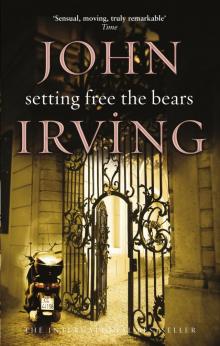 Setting Free the Bears
Setting Free the Bears The Fourth Hand
The Fourth Hand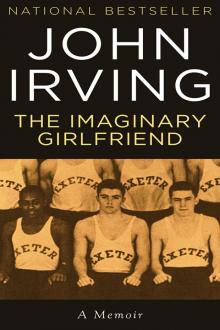 The Imaginary Girlfriend
The Imaginary Girlfriend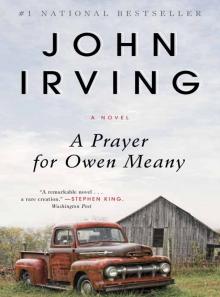 A Prayer for Owen Meany
A Prayer for Owen Meany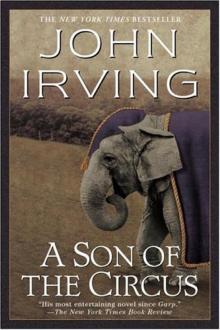 A Son of the Circus
A Son of the Circus Last Night in Twisted River
Last Night in Twisted River The World According to Garp
The World According to Garp The Cider House Rules
The Cider House Rules The Hotel New Hampshire
The Hotel New Hampshire The 158-Pound Marriage
The 158-Pound Marriage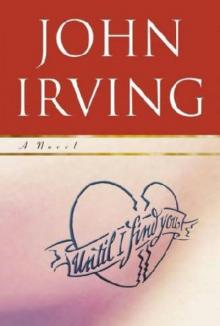 Until I Find You
Until I Find You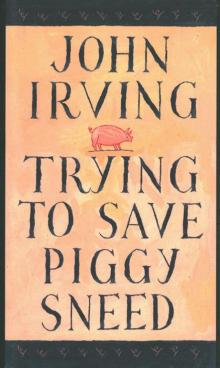 Trying to Save Piggy Sneed
Trying to Save Piggy Sneed Cider House Rules
Cider House Rules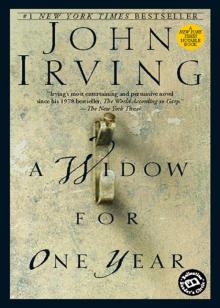 A Widow for One Year
A Widow for One Year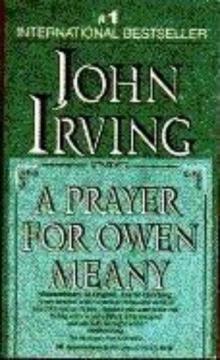 A prayer for Owen Meany: a novel
A prayer for Owen Meany: a novel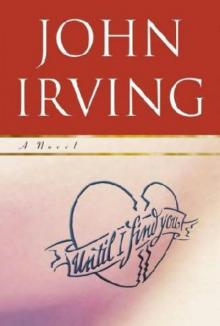 (2005) Until I Find You
(2005) Until I Find You